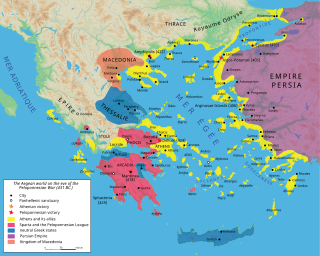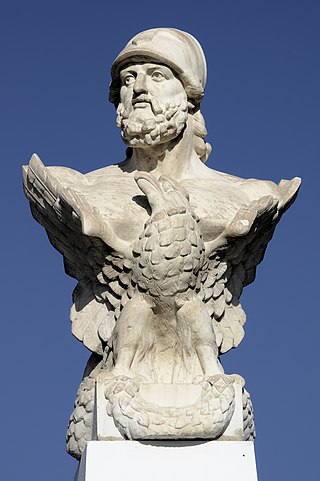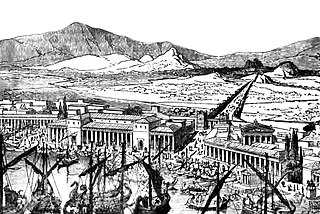
The Delian League, founded in 478 BC, was an association of Greek city-states, numbering between 150 and 330, under the leadership of Athens, whose purpose was to continue fighting the Persian Empire after the Greek victory in the Battle of Plataea at the end of the Second Persian invasion of Greece.

The Peloponnesian War was an ancient Greek war fought between Athens and Sparta and their respective allies for the hegemony of the Greek world. The war remained undecided for a long time, until the decisive intervention of the Persian Empire in support of Sparta. Led by Lysander, the Spartan fleet, built with Persian subsidies, finally defeated Athens and started a period of Spartan hegemony over Greece.

The Peloponnesian League was an alliance of ancient Greek city-states, dominated by Sparta and centred on the Peloponnese, which lasted from c.550 to 366 BC. It is known mainly for being one of the two rivals in the Peloponnesian War, against the Delian League, which was dominated by Athens.

Thucydides was an Athenian historian and general. His History of the Peloponnesian War recounts the fifth-century BC war between Sparta and Athens until the year 411 BC. Thucydides has been dubbed the father of "scientific history" by those who accept his claims to have applied strict standards of impartiality and evidence-gathering and analysis of cause and effect, without reference to intervention by the gods, as outlined in his introduction to his work.

Pericles was a Greek politician and general during the Golden Age of Athens. He was prominent and influential in Ancient Athenian politics, particularly between the Greco-Persian Wars and the Peloponnesian War, and was acclaimed by Thucydides, a contemporary historian, as "the first citizen of Athens". Pericles turned the Delian League into an Athenian empire and led his countrymen during the first two years of the Peloponnesian War. The period during which he led Athens, roughly from 461 to 429 BC, is sometimes known as the "Age of Pericles", but the period thus denoted can include times as early as the Persian Wars or as late as the following century.

The Battle of Salamis was a naval battle fought in 480 BC, between an alliance of Greek city-states under Themistocles, and the Persian Empire under King Xerxes. It resulted in a decisive victory for the outnumbered Greeks. The battle was fought in the straits between the mainland and Salamis, an island in the Saronic Gulf near Athens, and marked the high point of the second Persian invasion of Greece.

Lysander was a Spartan military and political leader. He destroyed the Athenian fleet at the Battle of Aegospotami in 405 BC, forcing Athens to capitulate and bringing the Peloponnesian War to an end. He then played a key role in Sparta's domination of Greece for the next decade until his death at the Battle of Haliartus.
A paean is a song or lyric poem expressing triumph or thanksgiving. In classical antiquity, it is usually performed by a chorus, but some examples seem intended for an individual voice (monody). It comes from the Greek παιάν, "song of triumph, any solemn song or chant". "Paeon" was also the name of a divine physician and an epithet ("byname") of Apollo.

The Greco-Persian Wars were a series of conflicts between the Achaemenid Empire and Greek city-states that started in 499 BC and lasted until 449 BC. The collision between the fractious political world of the Greeks and the enormous empire of the Persians began when Cyrus the Great conquered the Greek-inhabited region of Ionia in 547 BC. Struggling to control the independent-minded cities of Ionia, the Persians appointed tyrants to rule each of them. This would prove to be the source of much trouble for the Greeks and Persians alike.
Cleomenes I was Agiad King of Sparta from c. 524 to c. 490 BC. One of the most important Spartan kings, Cleomenes was instrumental in organising the Greek resistance against the Persian Empire of Darius, as well as shaping the geopolitical balance of Classical Greece.
The Peace of Callias is a purported peace treaty that supposedly was established around 449 BC between the Delian League and the Achaemenid Empire and ended the Greco-Persian Wars. The peace would then be the first compromise treaty between Achaemenid Persia and a Greek city.
Pleistoanax, also spelled Plistoanax, was Agiad king of Sparta from 458 to 409 BC. He was the leader of the peace party in Sparta at a time of violent confrontations against Athens for the hegemony over Greece.

Donald Kagan was a Lithuanian-born American historian and classicist at Yale University specializing in ancient Greece. He formerly taught in the Department of History at Cornell University. Kagan was considered among the foremost American scholars of Greek history and is notable for his four-volume history of the Peloponnesian War.
Rex Warner was an English classicist, writer, and translator. He is now probably best remembered for The Aerodrome (1941). Warner was described by V. S. Pritchett as "the only outstanding novelist of ideas whom the decade of ideas produced".

Cimon or Kimon was an Athenian strategos and politician.

Although long walls were built at several locations in ancient Greece, notably Corinth and Megara, the term Long Walls generally refers to the walls that connected Athens' main city to its ports at Piraeus and Phaleron. Built in several phases, they provided a secure connection to the sea even during times of siege. The walls were about 6 km (3.7 mi) long. Construction began in the mid-5th century BC, and the walls were destroyed by the Spartans in 403 BC after Athens' defeat in the Peloponnesian War. They were rebuilt with Persian support during the Corinthian War in 395–391 BC. The Long Walls were a key element of Athenian military strategy, since they provided the city with a constant link to the sea and thwarted sieges conducted by land alone.

Classical Greece was a period of around 200 years in Ancient Greece, marked by much of the eastern Aegean and northern regions of Greek culture gaining increased autonomy from the Persian Empire; the peak flourishing of democratic Athens; the First and Second Peloponnesian Wars; the Spartan and then Theban hegemonies; and the expansion of Macedonia under Philip II. Much of the early defining politics, artistic thought, scientific thought, theatre, literature and philosophy of Western civilization derives from this period of Greek history, which had a powerful influence on the later Roman Empire. Part of the broader era of classical antiquity, the classical Greek era ended after Philip II's unification of most of the Greek world against the common enemy of the Persian Empire, which was conquered within 13 years during the wars of Alexander the Great, Philip's son.

The following outline is provided as an overview of and topical guide to ancient Greece:

The Athenian military was the old main force of Athens, one of the major city-states (poleis) of Ancient Greece. It was largely similar to other armies of the region – see Ancient Greek warfare.

Pausanias was the Agiad King of Sparta; the son of Pleistoanax. He ruled Sparta from 445 BC to 427 BC and again from 409 BC to 395 BC. He was the leader of the faction in Sparta that opposed the imperialist policy conducted by Lysander.













